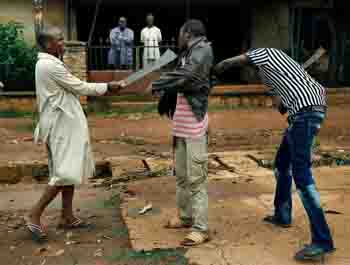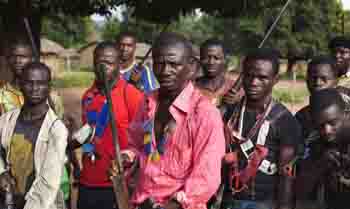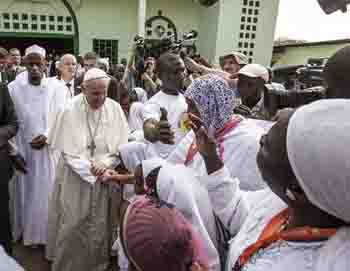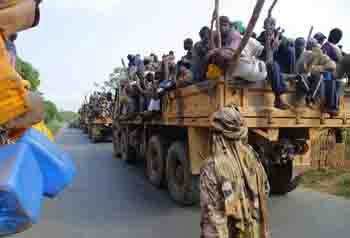Ecumenism
 |
 |
 |
 |
 |
 |
 |
Why Did Francis Visit the Mosque in Bangui?
During his trip to Africa, Francis made a point of visiting the war-torn, dangerous city of Bangui, the capital of the Central African Republic (CAR). Not many Americans know what is going on there.
In the CAR Catholic militias have organized their self-defense against the Muslims and are driving out them by the droves. In 2013, more than 100,000 Muslims lived in Bangui, whose total population was 750,000. Today, it is estimated that less than one thousand Muslims remain.
 Here is what happened.
Here is what happened.
In March of 2013, the Seleka, an Islamic coalition of militias, seized Bangui in a coup and installed the country's first Muslim president, Michel Djotodia. These Seleka militias, then, proceeded to terrorize the majority Catholic and Protestant population (in the CAR the population is 30% Catholic and 50% Protestant and 15% Muslim).
Today international press organs conveniently ignore the unspeakable atrocities that were perpetrated on the Catholics there, but the Bangui inhabitants have not forgotten the terror they experienced.
The Muslims of the country joined the ranks of the militias; Muslims from other countries also came for the looting and killing. Soon reports were out that the Muslims were raping the Catholic women, slitting children's throats, razing villages, burning Catholic churches, hacking off ears and limbs with machetes and throwing young men to crocodiles. Amnesty International mildly labeled these horrors “human rights violations.”
Calls were made for international intervention to protect the Catholic and Protestant population targeted for attack by the Muslims. A small contingent of African regional advisers and some French peacekeeping troops arrived, but to little effect.
So, rather than sit back and allow the minority Muslim militias to terrorize the populations and overrun the country, the Catholics and Protestants did something unusual in these pacifist times. They took up arms in vigilante-style militias called Anti-Balaka (that is, anti-machete).
Thousands have died in the fighting between the Anti-Balaka and Seleka, but the majority Anti-Balaka militias emerged victorious.
 Suddenly the press became a bit more interested in this African war, only to paint vivid pictures of the “intolerance” of Christians and the “bloody revenge“ they were wreaking on the “poor Muslims.” The commander of French troops in the CAR went so far as to accuse the Anti-Balaka militias of being the country's “main enemy of peace.”
Suddenly the press became a bit more interested in this African war, only to paint vivid pictures of the “intolerance” of Christians and the “bloody revenge“ they were wreaking on the “poor Muslims.” The commander of French troops in the CAR went so far as to accuse the Anti-Balaka militias of being the country's “main enemy of peace.”
The officials of the Catholic Church also are not supporting the Anti-Balaka militias. Bangui Archbishop Dieudonne Nzapalainga, recent recipient of a UN peace award, called on the media not to refer to the vigilantes as “Christian militias.” “Call them self-defense militias, village militias, but please spare us the word 'Christian' in this context,” he insisted. Why? Because they are causing Muslims to flee…
The result as of today: More than 440,000 Muslims have been displaced and are living in tent camps along the border and around 200,000 have fled to neighboring Cameroon, Chad and the Congo, according to the United Nations. The 15% Muslim population has been reduced to less than 1 percent. Amnesty International terms this a “terrible ethnic cleansing” and hysterically warns of a “Muslim exodus of historic proportions.”
The response of the Anti-Balaka members is to proudly proclaim that they will not stop until they have “cleaned” the country of Muslims and made it safe for their wives and children to live and worship freely. They see this as a religious war and themselves as a militia defending their country.
Francis sabotages the self-defense fight
So, what did Francis do? He did not encourage the Catholic resistance and preach a crusade against the Muslims, as many would desire. He did the opposite, of course. He went to the Mosque of the city and, in a clear propaganda move, surrounded by imans and Muslim children, he greeted the group as “dear Muslim friends and followers of Islam.”
Then, he proceeded to preach peace and brotherhood: “Christians and Muslims are brothers and sisters,” he said.
 In view of the war going on outside the door, nothing could be more favorable to the Muslims. But Francis actually found something more unrealistic to say next. Against all evidence, he insisted that the reasons for the fight are “not grounded in properly religious motives.”
In view of the war going on outside the door, nothing could be more favorable to the Muslims. But Francis actually found something more unrealistic to say next. Against all evidence, he insisted that the reasons for the fight are “not grounded in properly religious motives.”
No, for Francis, it is not a religious war at all. He did not specify what it really was, but from his other comments in Africa, he would probably blame Capitalism, the diamond trade, or perhaps even climate change for the mutual killing that is going on today in the CAR.
If you go to the streets, however, where the fight is taking place, and talk to the people, you will hear the truth, what everyone knows, that this is a religious war. Anti-Balaka chief Captain Dopani Firmin states firmly, “We cannot accept to live together with Muslims, long-term. It's our right to kill Muslims.”
The Muslims also acknowledge the religious nature of the war and proclaim their aim to continue the fight. A Muslim woman called Abidah living in one of the refugee camps on the border guarded by UN troops lost her husband in the fighting a year ago, and her sons want revenge. “Every person outside there is an enemy and divided on religious beliefs,” she says simply.
 “I am ready to kill,” says Younus Yamsa, another Muslim refugee in a camp. “If Allah gives me the opportunity to get revenge, I will take it,” he told sympathetic reporters. “Otherwise I will tell the story to my children so they can avenge us.”
“I am ready to kill,” says Younus Yamsa, another Muslim refugee in a camp. “If Allah gives me the opportunity to get revenge, I will take it,” he told sympathetic reporters. “Otherwise I will tell the story to my children so they can avenge us.”
These are the people that Francis and UN peacekeepers are encouraging the CAR population to accept back into their lands as “brothers” in order “to stabilize” the country. The Anti-Balaka, on the other hand, are facing the actual reality: They know that the only way to stabilize their country is to rid it of the Muslims, whose stated aim is to destroy Christianity and dominate the world.
It seems to me the world should consider the model of the Anti-Balaka militias in Bangui as a natural self-defense reaction to the growing Islamic terrorism that we are seeing everywhere in Africa, Europe and the United States.
If the Progressivist Church and the Masonic UN were not doing all they can to prevent these natural reactions from sprouting, a good part of the Muslim threat to the world would be resolved.

In the CAR Catholic militias have organized their self-defense against the Muslims and are driving out them by the droves. In 2013, more than 100,000 Muslims lived in Bangui, whose total population was 750,000. Today, it is estimated that less than one thousand Muslims remain.

Muslim militias members with machetes terrorized Catholics and Protestants
In March of 2013, the Seleka, an Islamic coalition of militias, seized Bangui in a coup and installed the country's first Muslim president, Michel Djotodia. These Seleka militias, then, proceeded to terrorize the majority Catholic and Protestant population (in the CAR the population is 30% Catholic and 50% Protestant and 15% Muslim).
Today international press organs conveniently ignore the unspeakable atrocities that were perpetrated on the Catholics there, but the Bangui inhabitants have not forgotten the terror they experienced.
The Muslims of the country joined the ranks of the militias; Muslims from other countries also came for the looting and killing. Soon reports were out that the Muslims were raping the Catholic women, slitting children's throats, razing villages, burning Catholic churches, hacking off ears and limbs with machetes and throwing young men to crocodiles. Amnesty International mildly labeled these horrors “human rights violations.”
Calls were made for international intervention to protect the Catholic and Protestant population targeted for attack by the Muslims. A small contingent of African regional advisers and some French peacekeeping troops arrived, but to little effect.
So, rather than sit back and allow the minority Muslim militias to terrorize the populations and overrun the country, the Catholics and Protestants did something unusual in these pacifist times. They took up arms in vigilante-style militias called Anti-Balaka (that is, anti-machete).
Thousands have died in the fighting between the Anti-Balaka and Seleka, but the majority Anti-Balaka militias emerged victorious.

Anti-Balaka men who decided to fight back in legitimate defense to protect faith and family
The officials of the Catholic Church also are not supporting the Anti-Balaka militias. Bangui Archbishop Dieudonne Nzapalainga, recent recipient of a UN peace award, called on the media not to refer to the vigilantes as “Christian militias.” “Call them self-defense militias, village militias, but please spare us the word 'Christian' in this context,” he insisted. Why? Because they are causing Muslims to flee…
The result as of today: More than 440,000 Muslims have been displaced and are living in tent camps along the border and around 200,000 have fled to neighboring Cameroon, Chad and the Congo, according to the United Nations. The 15% Muslim population has been reduced to less than 1 percent. Amnesty International terms this a “terrible ethnic cleansing” and hysterically warns of a “Muslim exodus of historic proportions.”
The response of the Anti-Balaka members is to proudly proclaim that they will not stop until they have “cleaned” the country of Muslims and made it safe for their wives and children to live and worship freely. They see this as a religious war and themselves as a militia defending their country.
Francis sabotages the self-defense fight
So, what did Francis do? He did not encourage the Catholic resistance and preach a crusade against the Muslims, as many would desire. He did the opposite, of course. He went to the Mosque of the city and, in a clear propaganda move, surrounded by imans and Muslim children, he greeted the group as “dear Muslim friends and followers of Islam.”
Then, he proceeded to preach peace and brotherhood: “Christians and Muslims are brothers and sisters,” he said.

Francis warmly greets Muslims in the Grand Mosque of Bangui, one of the few left standing
No, for Francis, it is not a religious war at all. He did not specify what it really was, but from his other comments in Africa, he would probably blame Capitalism, the diamond trade, or perhaps even climate change for the mutual killing that is going on today in the CAR.
If you go to the streets, however, where the fight is taking place, and talk to the people, you will hear the truth, what everyone knows, that this is a religious war. Anti-Balaka chief Captain Dopani Firmin states firmly, “We cannot accept to live together with Muslims, long-term. It's our right to kill Muslims.”
The Muslims also acknowledge the religious nature of the war and proclaim their aim to continue the fight. A Muslim woman called Abidah living in one of the refugee camps on the border guarded by UN troops lost her husband in the fighting a year ago, and her sons want revenge. “Every person outside there is an enemy and divided on religious beliefs,” she says simply.

Convoys of trucks with Muslims leaving Bangui
These are the people that Francis and UN peacekeepers are encouraging the CAR population to accept back into their lands as “brothers” in order “to stabilize” the country. The Anti-Balaka, on the other hand, are facing the actual reality: They know that the only way to stabilize their country is to rid it of the Muslims, whose stated aim is to destroy Christianity and dominate the world.
It seems to me the world should consider the model of the Anti-Balaka militias in Bangui as a natural self-defense reaction to the growing Islamic terrorism that we are seeing everywhere in Africa, Europe and the United States.
If the Progressivist Church and the Masonic UN were not doing all they can to prevent these natural reactions from sprouting, a good part of the Muslim threat to the world would be resolved.

Posted December 4, 2015
______________________
______________________



